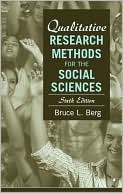

 |

|

The average rating for Qualitative Research Methods for the Social Sciences based on 2 reviews is 4.5 stars.
Review # 1 was written on 2017-06-01 00:00:00 Kevin Wise Kevin WiseVery very helpful |
Review # 2 was written on 2016-07-03 00:00:00 Shelley Weems Shelley WeemsHere I read Chapter 11: An introduction to content analysis and Chapter 4: A dramaturgical look at interviewing. The book was published in 2009. Chapter 11 In Chapter 11 a definition of content analysis is provided. It is "a coding operation and data interpreting process" (Bogdan & Biklan, 2006; Maxfield & Babbie, 2006; Morse & Richards, 2002). "It is an examination and interpretation of data which aims to identify patterns, themes, biases & meanings (Berg & Latin, 2008; Leedy & Ormrod, 2005; Neuendorf, 2002). Miles and Huberman (1994) identify three major approaches to qualitative data analysis: interpretative approaches (transferring social action as text), social anthropological approaches (case studies and writing field notes), collaborative social research approaches (using subjects to create change using their feedback). Hsieh and Shannon (2005) identify three approaches to the conduct of qualitative content analysis and differ based on the degree of inductive reasoning. Conventional content analysis (coding categories derived directly and inductively from the raw data itself and some people refer to this as a grounded theoretical approach); Directed content analysis (codes are derived from existing theories); Summative content analysis (begins by coding existing words in the text and counts these). Content analysis is any technique for making inferences by systematically and objectively identifying special characteristics of messages (Holsti, 1968, p.608). For this perspective, photographs, videotapes, or any other item that can be made into text are amenable to content analysis. This chapter also discusses the process of content analysis (order of sequence): -Data is collected and made into text (E.g. transcripts) -codes are analytically developed or inductively identified in the data -codes are transformed into categorical labels or themes -materials are sorted by these categories, identifying similar phrases, patterns, relationships and commonalties or disparities -sorted materials are examined to isolate meaningful patterns and processes -identified patterns are considered in light of previous research and theories, and is small set of generalizations are established. It also discusses the use of computers and computer software when using content analysis. It also discusses the strengths and weaknesses of using this type of analysis. Chapter 4 Chapter four discusses everything about interviewing. "Being a good interviewer is described as an innate ability or quality possessed by only certain people". Gorden (1992) offers a clear, step by step description of how to go about the process of interviewing. This chapter discusses the types of interviews (standardized interviewed, semistandardized interviews, and unstandardized interviews)(i.e., structured, semi-structured, and unstructured) and the characteristics of each type of interview. It discusses schedules and how to develop them. It is recommended to begin with an outline (Patton, 2002) listing all the broad categories relevant to the study. This chapter also discusses types of questions and ordering of questions. The general sequence of questions: -start with an easy (Demographic) question -begin with more important questions -more sensitive questions can follow -validate questions -ask the most important questions -then repeat steps, 3, 4, and so on. It discusses types of questions including essential questions, extra questions, throw away questions, and probing questions. |
CAN'T FIND WHAT YOU'RE LOOKING FOR? CLICK HERE!!!